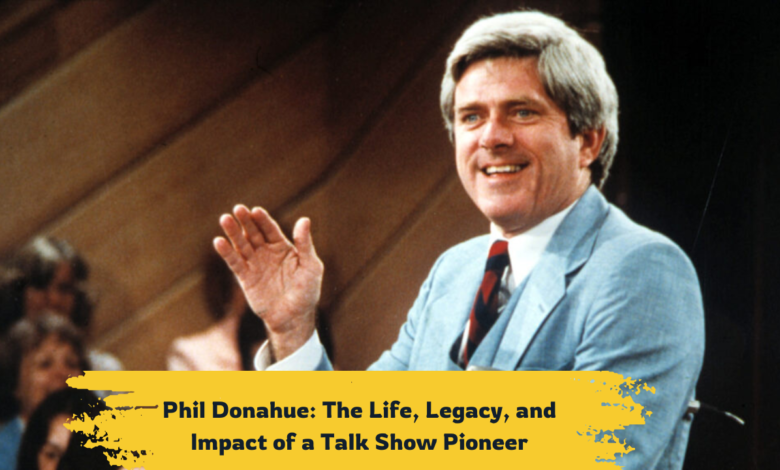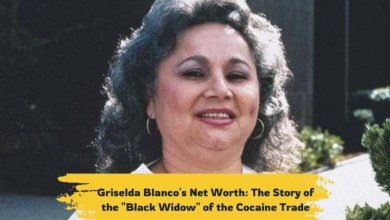Phil Donahue: The Life, Legacy, and Impact of a Talk Show Pioneer

Phil Donahue, a name synonymous with American talk show television, passed away at the age of 88. His death marks the end of an era, but his influence on the media landscape will continue to resonate for generations. Donahue wasn’t just a talk show host; he was a pioneer who revolutionized the format, turning daytime television into a platform for discussing important social issues, often ones that were controversial or groundbreaking for their time.
In this article, we will delve into the life and legacy of Phil Donahue, exploring his early beginnings, his rise to fame, the impact of his work, and the cultural shifts he helped to shape. By examining his career, we gain insight into how Donahue’s approach to talk television transformed public discourse and set the stage for the modern talk show format we know today.
Early Life and Career Beginnings
Born on December 21, 1935, in Cleveland, Ohio, Phillip John Donahue grew up in a working-class Irish Catholic family. His early life was marked by a strong sense of community and a deep interest in the world around him, traits that would later influence his approach to television. Donahue attended the University of Notre Dame, where he majored in business administration, but his passion for communication quickly led him to pursue a career in broadcasting.
Donahue began his broadcasting career in 1957 as a production assistant at KYW radio and television in Cleveland. He quickly moved up the ranks, working as a news reporter and eventually becoming an anchor. However, it was his transition to the talk show format that would set the stage for his groundbreaking career.
In 1967, Donahue launched “The Phil Donahue Show” on WLWD in Dayton, Ohio. The show initially focused on interviews with local celebrities and community figures, but Donahue’s curiosity and willingness to tackle challenging subjects soon led to a broader scope. The show became known for its willingness to explore topics that were often ignored or considered taboo, such as civil rights, gender equality, and the Vietnam War.
The Evolution of “The Phil Donahue Show”
As “The Phil Donahue Show” gained popularity, it expanded into national syndication in 1970, bringing Donahue’s unique style of television to a wider audience. Unlike other talk shows of the time, which often focused on light-hearted entertainment or celebrity interviews, Donahue’s show was known for its substantive content and intellectual rigor.
Donahue was a master of creating a space where difficult conversations could take place. His show became a forum for discussing issues that were often controversial or divisive, but always with a focus on fostering understanding and dialogue. Whether it was bringing on guests to discuss the feminist movement, the experiences of LGBTQ individuals, or the complexities of race relations, Donahue approached each topic with sensitivity and a genuine desire to educate his audience.
One of the key innovations of “The Phil Donahue Show” was the involvement of the studio audience. Donahue regularly invited audience members to ask questions and share their perspectives, making the show a more interactive and democratic experience. This format not only engaged viewers but also reflected Donahue’s belief in the importance of public discourse and the power of ordinary people to influence change.
Breaking Barriers and Pushing Boundaries
Throughout his career, Phil Donahue was never afraid to push boundaries. He was one of the first talk show hosts to bring marginalized voices to the forefront of mainstream media. For example, he gave a platform to Gloria Steinem and other leaders of the women’s rights movement, helping to bring feminist issues into the national conversation. He also provided a stage for Harvey Milk, one of the first openly gay elected officials in the United States, giving visibility to the LGBTQ rights movement at a time when it was still largely ignored by the mainstream media.
Donahue’s willingness to tackle controversial issues sometimes put him at odds with network executives and advertisers, but he remained steadfast in his commitment to honest, thought-provoking television. His show became a place where uncomfortable truths were confronted, and where viewers were encouraged to think critically about the world around them.
One of the most notable examples of Donahue’s impact came in the early 1980s when he devoted several episodes to the AIDS crisis. At a time when fear and misinformation about the disease were rampant, Donahue used his platform to educate the public, interview medical experts, and give voice to those affected by the epidemic. His efforts helped to combat stigma and raise awareness about the need for compassion and understanding in the face of a public health crisis.
Phil Donahue’s Influence on Modern Talk Shows
Phil Donahue’s influence on the talk show format is undeniable. His approach to television paved the way for a new generation of talk show hosts who followed in his footsteps, including Oprah Winfrey, who has often cited Donahue as a major influence on her career. Winfrey, like Donahue, used her platform to explore difficult topics and give a voice to those who were often marginalized or overlooked by mainstream media.
Donahue’s legacy can also be seen in the evolution of daytime television, which increasingly focused on issues of social justice, politics, and human interest stories. The success of “The Phil Donahue Show” demonstrated that audiences were hungry for content that challenged them to think and engage with the world in a deeper way.
Moreover, Donahue’s emphasis on audience participation and the inclusion of diverse perspectives became a hallmark of modern talk shows. Today, programs like “The View,” “Dr. Phil,” and “The Ellen DeGeneres Show” continue to build on the foundation that Donahue established, blending entertainment with meaningful discussions about the issues that shape our society.
The Personal Side of Phil Donahue
Beyond his professional achievements, Phil Donahue was also known for his personal integrity and commitment to social justice. He was a vocal advocate for various causes throughout his life, including opposition to the Iraq War, support for veterans’ rights, and championing civil liberties.
Donahue’s personal life was marked by a deep sense of empathy and a desire to make a positive impact on the world. He married actress Marlo Thomas in 1980, and together they became known for their philanthropic efforts, particularly in support of children’s charities and hospitals. Their partnership was a testament to Donahue’s belief in using his influence for good and giving back to the community.
In his later years, Donahue remained active in social and political causes, often speaking out on issues he cared about and continuing to engage with the public through various media appearances and interviews. His commitment to social justice and his belief in the power of dialogue remained central to his identity until the end of his life.
The Legacy of Phil Donahue
Phil Donahue’s death marks the end of a remarkable career, but his legacy will continue to live on through the countless lives he touched and the lasting impact of his work. As a talk show host, Donahue broke new ground, challenging the conventions of television and creating a space where important conversations could take place. His willingness to tackle difficult issues and give a platform to marginalized voices helped to shape the national conversation on a wide range of topics, from civil rights to health care to LGBTQ rights.
Donahue’s influence can be seen in the many talk show hosts and journalists who have followed in his footsteps, carrying forward his commitment to meaningful, impactful television. His legacy is also reflected in the ongoing cultural shifts towards greater inclusivity, understanding, and social justice.
As we reflect on Phil Donahue’s life and career, it is clear that his contributions to television and public discourse were profound and far-reaching. He was a pioneer who used his platform to educate, challenge, and inspire, leaving behind a legacy that will continue to shape the media landscape for years to come.
In remembering Phil Donahue, we honor a man who believed in the power of conversation to change the world. His work reminds us of the importance of engaging with the issues that matter, listening to diverse perspectives, and using our voices to make a difference. Phil Donahue may be gone, but his impact will endure, inspiring future generations to continue the work he began.




